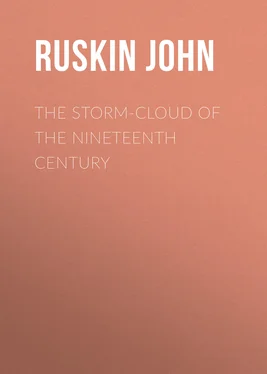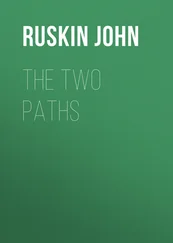John Ruskin - The Storm-Cloud of the Nineteenth Century
Здесь есть возможность читать онлайн «John Ruskin - The Storm-Cloud of the Nineteenth Century» — ознакомительный отрывок электронной книги совершенно бесплатно, а после прочтения отрывка купить полную версию. В некоторых случаях можно слушать аудио, скачать через торрент в формате fb2 и присутствует краткое содержание. Жанр: foreign_prose, literature_19, foreign_antique, на английском языке. Описание произведения, (предисловие) а так же отзывы посетителей доступны на портале библиотеки ЛибКат.
- Название:The Storm-Cloud of the Nineteenth Century
- Автор:
- Жанр:
- Год:неизвестен
- ISBN:нет данных
- Рейтинг книги:3 / 5. Голосов: 1
-
Избранное:Добавить в избранное
- Отзывы:
-
Ваша оценка:
- 60
- 1
- 2
- 3
- 4
- 5
The Storm-Cloud of the Nineteenth Century: краткое содержание, описание и аннотация
Предлагаем к чтению аннотацию, описание, краткое содержание или предисловие (зависит от того, что написал сам автор книги «The Storm-Cloud of the Nineteenth Century»). Если вы не нашли необходимую информацию о книге — напишите в комментариях, мы постараемся отыскать её.
The Storm-Cloud of the Nineteenth Century — читать онлайн ознакомительный отрывок
Ниже представлен текст книги, разбитый по страницам. Система сохранения места последней прочитанной страницы, позволяет с удобством читать онлайн бесплатно книгу «The Storm-Cloud of the Nineteenth Century», без необходимости каждый раз заново искать на чём Вы остановились. Поставьте закладку, и сможете в любой момент перейти на страницу, на которой закончили чтение.
Интервал:
Закладка:
John Ruskin
The Storm-Cloud of the Nineteenth Century / Two Lectures delivered at the London Institution February / 4th and 11th, 1884
PREFACE
The following lectures, drawn up under the pressure of more imperative and quite otherwise directed work, contain many passages which stand in need of support, and some, I do not doubt, more or less of correction, which I always prefer to receive openly from the better knowledge of friends, after setting down my own impressions of the matter in clearness as far as they reach, than to guard myself against by submitting my manuscript, before publication, to annotators whose stricture or suggestion I might often feel pain in refusing, yet hesitation in admitting.
But though thus hastily, and to some extent incautiously, thrown into form, the statements in the text are founded on patient and, in all essential particulars, accurately recorded observations of the sky, during fifty years of a life of solitude and leisure; and in all they contain of what may seem to the reader questionable, or astonishing, are guardedly and absolutely true.
In many of the reports given by the daily press, my assertion of radical change, during recent years, in weather aspect was scouted as imaginary, or insane. I am indeed, every day of my yet spared life, more and more grateful that my mind is capable of imaginative vision, and liable to the noble dangers of delusion which separate the speculative intellect of humanity from the dreamless instinct of brutes: but I have been able, during all active work, to use or refuse my power of contemplative imagination, with as easy command of it as a physicist's of his telescope: the times of morbid are just as easily distinguished by me from those of healthy vision, as by men of ordinary faculty, dream from waking; nor is there a single fact stated in the following pages which I have not verified with a chemist's analysis, and a geometer's precision.
The first lecture is printed, with only addition here and there of an elucidatory word or phrase, precisely as it was given on the 4th February. In repeating it on the 11th, I amplified several passages, and substituted for the concluding one, which had been printed with accuracy in most of the leading journals, some observations which I thought calculated to be of more general interest. To these, with the additions in the first text, I have now prefixed a few explanatory notes, to which numeral references are given in the pages they explain, and have arranged the fragments in connection clear enough to allow of their being read with ease as a second Lecture.
Herne Hill, 12th March, 1884 .
THE STORM-CLOUD OF THE NINETEENTH
CENTURY
Let me first assure my audience that I have no arrière pensée in the title chosen for this lecture. I might, indeed, have meant, and it would have been only too like me to mean, any number of things by such a title;—but, to-night, I mean simply what I have said, and propose to bring to your notice a series of cloud phenomena, which, so far as I can weigh existing evidence, are peculiar to our own times; yet which have not hitherto received any special notice or description from meteorologists.
So far as the existing evidence, I say, of former literature can be interpreted, the storm-cloud—or more accurately plague-cloud, for it is not always stormy—which I am about to describe to you, never was seen but by now living, or lately living eyes. It is not yet twenty years that this—I may well call it, wonderful, cloud has been, in its essence, recognizable. There is no description of it, so far as I have read, by any ancient observer. Neither Homer nor Virgil, neither Aristophanes nor Horace, acknowledge any such clouds among those compelled by Jove. Chaucer has no word of them, nor Dante; 1 1 The vapor over the pool of Anger in the 'Inferno,' the clogging stench which rises from Caina, and the fog of the circle of Anger in the 'Purgatorio' resemble, indeed, the cloud of the Plague-wind very closely,—but are conceived only as supernatural. The reader will no doubt observe, throughout the following lecture, my own habit of speaking of beautiful things as 'natural,' and of ugly ones as 'unnatural.' In the conception of recent philosophy, the world is one Kosmos in which diphtheria is held to be as natural as song, and cholera as digestion. To my own mind, and the more distinctly the more I see, know, and feel, the Earth, as prepared for the abode of man, appears distinctly ruled by agencies of health and disease, of which the first may be aided by his industry, prudence, and piety; while the destroying laws are allowed to prevail against him, in the degree in which he allows himself in idleness, folly, and vice. Had the point been distinctly indicated where the degrees of adversity necessary for his discipline pass into those intended for his punishment, the world would have been put under a manifest theocracy; but the declaration of the principle is at least distinct enough to have convinced all sensitive and earnest persons, from the beginning of speculation in the eyes and mind of Man: and it has been put in my power by one of the singular chances which have always helped me in my work when it was in the right direction, to present to the University of Oxford the most distinct expression of this first principle of mediæval Theology which, so far as I know, exists in fifteenth-century art. It is one of the drawings of the Florentine book which I bought for a thousand pounds, against the British Museum, some ten or twelve years since; being a compendium of classic and mediæval religious symbolism. In the two pages of it, forming one picture, given to Oxford, the delivery of the Law on Sinai is represented on the left hand, ( contrary to the Scriptural narrative , but in deeper expression of the benediction of the Sacred Law to all nations,) as in the midst of bright and calm light, the figure of the Deity being supported by luminous and level clouds, and attended by happy angels: while opposite, on the right hand, the worship of the Golden Calf is symbolized by a single decorated pillar, with the calf on its summit, surrounded by the clouds and darkness of a furious storm, issuing from the mouths of fiends;—uprooting the trees, and throwing down the rocks, above the broken tables of the Law, of which the fragments lie in the foreground.
Milton none, nor Thomson. In modern times, Scott, Wordsworth and Byron are alike unconscious of them; and the most observant and descriptive of scientific men, De Saussure, is utterly silent concerning them. Taking up the traditions of air from the year before Scott's death, I am able, by my own constant and close observation, to certify you that in the forty following years (1831 to 1871 approximately—for the phenomena in question came on gradually)—no such clouds as these are, and are now often for months without intermission, were ever seen in the skies of England, France, or Italy.
In those old days, when weather was fine, it was luxuriously fine; when it was bad—it was often abominably bad, but it had its fit of temper and was done with it—it didn't sulk for three months without letting you see the sun,—nor send you one cyclone inside out, every Saturday afternoon, and another outside in, every Monday morning.
In fine weather the sky was either blue or clear in its light; the clouds, either white or golden, adding to, not abating, the luster of the sky. In wet weather, there were two different species of clouds,—those of beneficent rain, which for distinction's sake I will call the non-electric rain-cloud, and those of storm, usually charged highly with electricity. The beneficent rain-cloud was indeed often extremely dull and gray for days together, but gracious nevertheless, felt to be doing good, and often to be delightful after drought; capable also of the most exquisite coloring, under certain conditions;
Читать дальшеИнтервал:
Закладка:
Похожие книги на «The Storm-Cloud of the Nineteenth Century»
Представляем Вашему вниманию похожие книги на «The Storm-Cloud of the Nineteenth Century» списком для выбора. Мы отобрали схожую по названию и смыслу литературу в надежде предоставить читателям больше вариантов отыскать новые, интересные, ещё непрочитанные произведения.
Обсуждение, отзывы о книге «The Storm-Cloud of the Nineteenth Century» и просто собственные мнения читателей. Оставьте ваши комментарии, напишите, что Вы думаете о произведении, его смысле или главных героях. Укажите что конкретно понравилось, а что нет, и почему Вы так считаете.












